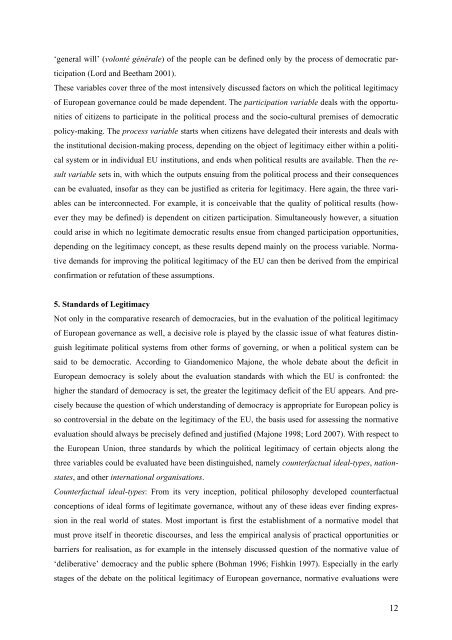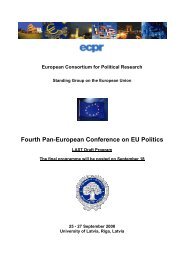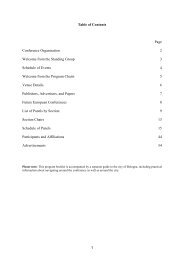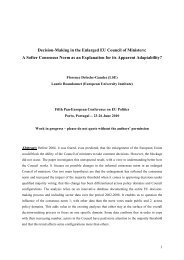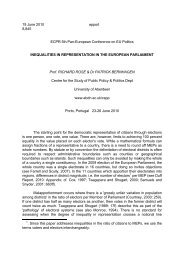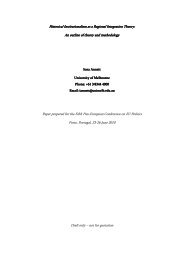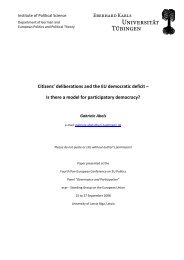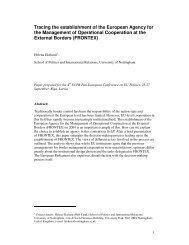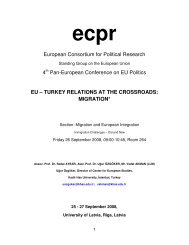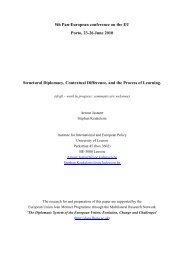Theorising the Democratic Legitimacy of European Governance
Theorising the Democratic Legitimacy of European Governance
Theorising the Democratic Legitimacy of European Governance
Create successful ePaper yourself
Turn your PDF publications into a flip-book with our unique Google optimized e-Paper software.
‘general will’ (volonté générale) <strong>of</strong> <strong>the</strong> people can be defined only by <strong>the</strong> process <strong>of</strong> democratic par-<br />
ticipation (Lord and Beetham 2001).<br />
These variables cover three <strong>of</strong> <strong>the</strong> most intensively discussed factors on which <strong>the</strong> political legitimacy<br />
<strong>of</strong> <strong>European</strong> governance could be made dependent. The participation variable deals with <strong>the</strong> opportunities<br />
<strong>of</strong> citizens to participate in <strong>the</strong> political process and <strong>the</strong> socio-cultural premises <strong>of</strong> democratic<br />
policy-making. The process variable starts when citizens have delegated <strong>the</strong>ir interests and deals with<br />
<strong>the</strong> institutional decision-making process, depending on <strong>the</strong> object <strong>of</strong> legitimacy ei<strong>the</strong>r within a political<br />
system or in individual EU institutions, and ends when political results are available. Then <strong>the</strong> result<br />
variable sets in, with which <strong>the</strong> outputs ensuing from <strong>the</strong> political process and <strong>the</strong>ir consequences<br />
can be evaluated, ins<strong>of</strong>ar as <strong>the</strong>y can be justified as criteria for legitimacy. Here again, <strong>the</strong> three variables<br />
can be interconnected. For example, it is conceivable that <strong>the</strong> quality <strong>of</strong> political results (however<br />
<strong>the</strong>y may be defined) is dependent on citizen participation. Simultaneously however, a situation<br />
could arise in which no legitimate democratic results ensue from changed participation opportunities,<br />
depending on <strong>the</strong> legitimacy concept, as <strong>the</strong>se results depend mainly on <strong>the</strong> process variable. Normative<br />
demands for improving <strong>the</strong> political legitimacy <strong>of</strong> <strong>the</strong> EU can <strong>the</strong>n be derived from <strong>the</strong> empirical<br />
confirmation or refutation <strong>of</strong> <strong>the</strong>se assumptions.<br />
5. Standards <strong>of</strong> <strong>Legitimacy</strong><br />
Not only in <strong>the</strong> comparative research <strong>of</strong> democracies, but in <strong>the</strong> evaluation <strong>of</strong> <strong>the</strong> political legitimacy<br />
<strong>of</strong> <strong>European</strong> governance as well, a decisive role is played by <strong>the</strong> classic issue <strong>of</strong> what features distinguish<br />
legitimate political systems from o<strong>the</strong>r forms <strong>of</strong> governing, or when a political system can be<br />
said to be democratic. According to Giandomenico Majone, <strong>the</strong> whole debate about <strong>the</strong> deficit in<br />
<strong>European</strong> democracy is solely about <strong>the</strong> evaluation standards with which <strong>the</strong> EU is confronted: <strong>the</strong><br />
higher <strong>the</strong> standard <strong>of</strong> democracy is set, <strong>the</strong> greater <strong>the</strong> legitimacy deficit <strong>of</strong> <strong>the</strong> EU appears. And precisely<br />
because <strong>the</strong> question <strong>of</strong> which understanding <strong>of</strong> democracy is appropriate for <strong>European</strong> policy is<br />
so controversial in <strong>the</strong> debate on <strong>the</strong> legitimacy <strong>of</strong> <strong>the</strong> EU, <strong>the</strong> basis used for assessing <strong>the</strong> normative<br />
evaluation should always be precisely defined and justified (Majone 1998; Lord 2007). With respect to<br />
<strong>the</strong> <strong>European</strong> Union, three standards by which <strong>the</strong> political legitimacy <strong>of</strong> certain objects along <strong>the</strong><br />
three variables could be evaluated have been distinguished, namely counterfactual ideal-types, nationstates,<br />
and o<strong>the</strong>r international organisations.<br />
Counterfactual ideal-types: From its very inception, political philosophy developed counterfactual<br />
conceptions <strong>of</strong> ideal forms <strong>of</strong> legitimate governance, without any <strong>of</strong> <strong>the</strong>se ideas ever finding expression<br />
in <strong>the</strong> real world <strong>of</strong> states. Most important is first <strong>the</strong> establishment <strong>of</strong> a normative model that<br />
must prove itself in <strong>the</strong>oretic discourses, and less <strong>the</strong> empirical analysis <strong>of</strong> practical opportunities or<br />
barriers for realisation, as for example in <strong>the</strong> intensely discussed question <strong>of</strong> <strong>the</strong> normative value <strong>of</strong><br />
‘deliberative’ democracy and <strong>the</strong> public sphere (Bohman 1996; Fishkin 1997). Especially in <strong>the</strong> early<br />
stages <strong>of</strong> <strong>the</strong> debate on <strong>the</strong> political legitimacy <strong>of</strong> <strong>European</strong> governance, normative evaluations were<br />
12


